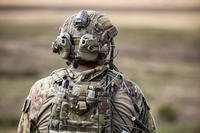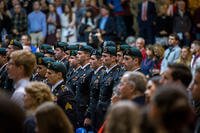When he heard of the Japanese attack on Pearl Harbor in 1941, the Rev. George L. Fox knew what was to come. "I've got to go," Fox told his wife, Isadora. "I know from experience what those boys are about to face. They need me."
Fox's experience had been distilled during World War I. At 17, he lied about his age to enlist in the Marines as a medical assistant and train as an ambulance driver. Among other awards, Fox earned a Silver Star for rescuing a soldier from a gas-filled battlefield although he wore no mask himself.
Now, the 42-year-old Fox — who at 5 feet, 7 inches had been nicknamed "The Little Minister" during his Methodist theological studies — immediately enlisted for chaplain duty. He was older than many of his fellows at the Harvard-based Army chaplain's course, but he bonded with many of them — in particular, Rabbi Alexander D. Goode. Fox and Goode were sent to Camp Myles Standish, Mass., en route to overseas duty. There, the two chaplains became friends with the Rev. Clark V. Poling of the Dutch Reformed Church and the Rev. John P. Washington, a Roman Catholic priest.
The four men were assigned to the USAT Dorchester, a former luxury liner filled to capacity in February 1943 with 751 troops. To sail from Newfoundland to Greenland, the ship would have to navigate icy seas and pass through waters infested with German U-boats. The "four chaplains," as they came to be known, spent their time calming nervous young soldiers, even putting on evening variety shows to help pass the time.
On Feb. 3, 1943, the ship was struck by an enemy torpedo and began sinking fast. The chaplains passed out life vests, and when no more were left, offered their own. No one knows which of the four gave up his vest first, but a witness said, "It was the finest thing I have ever seen this side of heaven." Fox and his colleagues then linked arms and held tight against the starboard-listing deck as each prayed in his own words to their one God.
The Dorchester and the four brave chaplains soon disappeared beneath the waves. On Dec. 19, 1944, the Distinguished Service Cross for "extraordinary heroism" and the Purple Heart were awarded posthumously to the chaplains' next of kin. In 1961, the U.S. Congress authorized for the four a unique Special Medal for Heroism, which had never been given before and is never to be given again.
On July 29, 2000, the Army Chaplain Corps will celebrate its 225th anniversary. "Army chaplaincy can be a costly discipleship," says Maj. Gen. Gaylord T. Gunhus, chief of Army Chaplains. "In the 20th century alone, a total of 124 chaplains gave their lives in service to our nation." The Rev. George L. Fox and his three comrades in faith made that sacrifice so that others might survive.
Related links:















